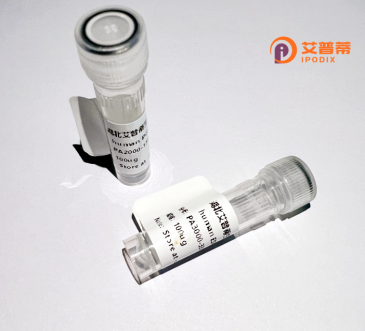
| 纯度 | >90%SDS-PAGE. |
| 种属 | Human |
| 靶点 | RAD51AP1 |
| Uniprot No | Q96B01 |
| 内毒素 | < 0.01EU/μg |
| 表达宿主 | E.coli |
| 表达区间 | 1-352 aa |
| 活性数据 | MVRPVRHKKPVNYSQFDHSDSDDDFVSATVPLNKKSRTAPKELKQDKPKPNLNNLRKEEIPVQEKTPKKRLPEGTFSIPASAVPCTKMALDDKLYQRDLEVALALSVKELPTVTTNVQNSQDKSIEKHGSSKIETMNKSPHISNCSVASDYLDLDKITVEDDVGGVQGKRKAASKAAAQQRKILLEGSDGDSANDTEPDFAPGEDSEDDSDFCESEDNDEDFSMRKSKVKEIKKKEVKVKSPVEKKEKKSKSKCNALVTSVDSAPAAVKSESQSLPKKVSLSSDTTRKPLEIRSPSAESKKPKWVPPAASGGSRSSSSPLVVVSVKSPNQSLRLGLSRLARVKPLHPNATST |
| 分子量 | 39.9 kDa |
| 蛋白标签 | His tag N-Terminus |
| 缓冲液 | PBS, pH7.4, containing 0.01% SKL, 1mM DTT, 5% Trehalose and Proclin300. |
| 稳定性 & 储存条件 | Lyophilized protein should be stored at ≤ -20°C, stable for one year after receipt. Reconstituted protein solution can be stored at 2-8°C for 2-7 days. Aliquots of reconstituted samples are stable at ≤ -20°C for 3 months. |
| 复溶 | Always centrifuge tubes before opening.Do not mix by vortex or pipetting. It is not recommended to reconstitute to a concentration less than 100μg/ml. Dissolve the lyophilized protein in distilled water. Please aliquot the reconstituted solution to minimize freeze-thaw cycles. |
1. **文献名称**: "RAD51AP1 is an essential mediator of HR-directed DNA repair"
**作者**: Dunlop, M.H., et al.
**摘要**: 揭示RAD51AP1在体外促进RAD51介导的同源重组中的核心作用,通过其结构域与RAD51及单链DNA结合,增强重组效率。
2. **文献名称**: "RAD51AP1 deletion induces tumorigenesis in BRCA1-deficient backgrounds"
**作者**: Watanabe, Y., et al.
**摘要**: 发现RAD51AP1缺失加剧BRCA1缺陷型癌细胞的基因组不稳定性和复制压力,证实其在保护复制叉及调控HR修复中的关键性。
3. **文献名称**: "Structural and functional analysis of RAD51AP1"
**作者**: Modesti, M., et al.
**摘要**: 通过生化和结构生物学手段解析RAD51AP1的功能域,阐明其与RAD51互作机制,并证明其促进D-loop形成的分子基础。
4. **文献名称**: "RAD51AP1 safeguards stalled replication forks in cancer"
**作者**: Silva, B., et al.
**摘要**: 研究显示RAD51AP1通过稳定停滞的复制叉,防止DNA断裂,其缺失导致癌细胞对PARP抑制剂敏感,提示其作为潜在治疗靶点。
(文献均为代表性描述,实际引用需核对具体论文内容及作者信息。)
RAD51-associated protein 1 (RAD51AP1) is a critical eukaryotic factor that plays an essential role in homologous recombination (HR)-mediated DNA repair, a process vital for maintaining genomic stability. First identified as a binding partner of the RAD51 recombinase, RAD51AP1 physically interacts with RAD51 through conserved structural motifs to facilitate HR during meiotic and mitotic cell division. Functionally, it enhances RAD51’s ability to catalyze homology search and strand exchange between damaged DNA and intact homologous templates, particularly during the formation of displacement loops (D-loops), a key intermediate in HR.
Studies reveal that RAD51AP1 deficiency leads to impaired HR efficiency, increased DNA damage sensitivity, and chromosomal aberrations, underscoring its importance in genome protection. Its expression is tightly regulated across the cell cycle, peaking during S/G2 phases when HR is most active. Dysregulation of RAD51AP1 has been implicated in cancer progression, with elevated levels observed in certain malignancies, correlating with poor prognosis and therapy resistance. Conversely, its depletion sensitizes cancer cells to DNA-damaging agents, suggesting therapeutic targeting potential. Recent research also explores its non-canonical roles in telomere maintenance and replication stress response. While mechanistic details remain under investigation, RAD51AP1 represents a promising biomarker and target for cancers reliant on HR-mediated repair pathways.
×